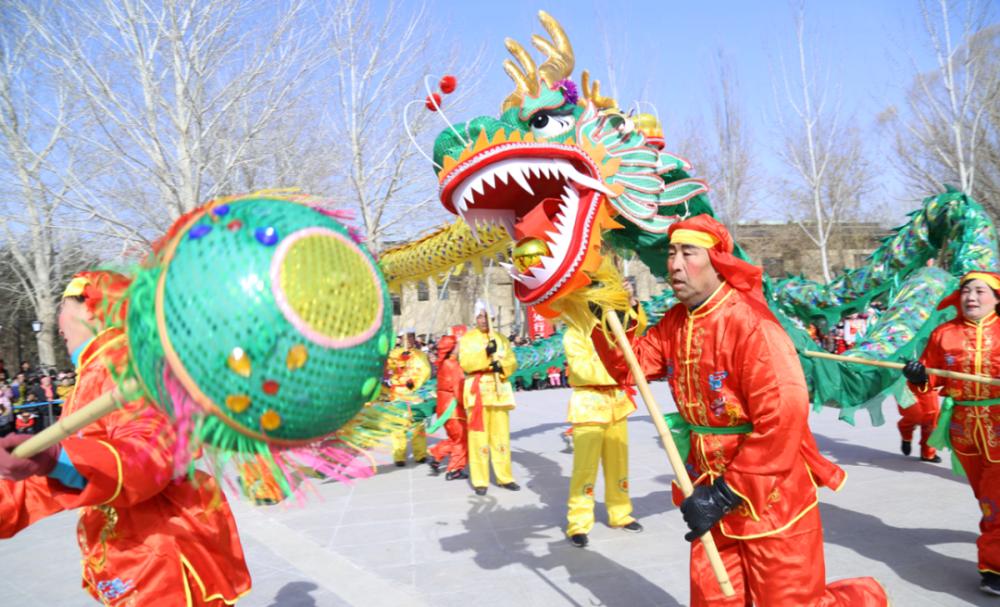What kind of experience will you have in Dunhuang, Gansu, a famous historical and cultural city in the great northwest?
Chen Yu, an expert in Dunhuang folklore, said that the reunion day of Chinese New Year's Eve is the beginning of the entire New Year, and the family members who are away from home should rush home for reunion on this day as much as possible. Chinese New Year's Eve afternoon, when the children of Dunhuang are playing and playing, it is also the busiest time for adults.
Men should put spring leagues and door gods on each door of the house, paste "trough heads and prosperity" in the cow pen, and post big red banners on the trees and firewood stacks in front of the gate that read", "Go out to see joy" and "Hope for wealth"; housewives are busy preparing to make the most abundant and meaningful New Year's meal of the year.

Dragon dance performance on the fire of the New Year Society in Dunhuang City, Jiuquan City, Gansu Province. Photo courtesy of the Propaganda Department of dunhuang Municipal Party Committee in Jiuquan City, Gansu Province
The New Year's meal is usually prepared when the sun goes down, and when the sky is just getting dark, people first "ask the gods" (worship the ancestors).
The whole family brought paper money, tobacco and alcohol, tea and all kinds of food to the clean open space outside the house to burn paper, kowtow, and respectfully invite the ancestors to go home for the New Year; after returning home from burning the paper, put offerings in front of the ancestors' tablets, and then burn incense and kneel.
After the ancestors have eaten, the whole family can start eating.
"This fully demonstrates the traditional virtues of Dunhuang people and the Chinese nation of filial piety first." Chen Yu said: In addition, on the first day of the first lunar month, Dunhuang people have to get up at dawn and cannot sleep lazily. The first thing people do when they wake up is to pay homage to their ancestors, then set off firecrackers, and then eat dumplings. Dumplings are wrapped Chinese New Year's Eve at night, and should be eaten early, which means that people are diligent and rich in the new year.
At the same time, eating dumplings on the morning of the first day of the first year is because the word "he" of the noodles is the meaning of "he", the "dumplings" and "jiao" of the dumplings are harmonious, and the "he" and "jiao" also have the meaning of getting together, so the dumplings are used to symbolize the reunion. In addition, because dumplings resemble yuanbao, eating dumplings during the New Year also carries the meaning of "recruiting wealth into treasure".
In addition to family customs, a reporter from China City Daily interviewed a number of Dunhuang citizens and learned that every New Year's Day, dragon dances, lions, Taiping drums, twisting songs, running dry boats, stepping on stilts, and "returning to the mother's home, the big head monk plays Liu Liang" and other social fire performances are the New Year performance forms that Dunhuang people like to see.
In the past New Year, dunhuang Mingsha Mountain under the clear sky, the sun is brilliant, the crescent spring town under the mountain is noisy, the bunting flags flutter, the crowds are crowded, and the traditional social fire team of hundreds of people takes turns to welcome the arrival of the New Year in a public and festive way.
It is reported that the social fire performance is a performance activity spontaneously organized by the rural masses in Dunhuang. Dunhuang's "social fire" generally starts from the third day of the first lunar month and reaches a climax on the fifteenth day of the first month, and the scale of the social fire varies from dozens to hundreds of people.
In addition, during the day and night of the fifteenth day of the first month, Dunhuang people have to go out of their homes in groups to guess lantern riddles, visit temple fairs, and visit parks.
Chen Yu said: "In Dunhuang, there is a custom of 'walking a hundred diseases' on the fifteenth day of the first month, also known as 'scattering a hundred diseases'. On the fifteenth night, the whole family walked together or walked by the wall, or crossed the bridge, or walked outside the countryside, with the purpose of driving away diseases and disasters, which was both the climax of the Spring Festival and the end of the Spring Festival. ”
Layout Appreciation:
China City Daily ( 2022-01-17 22nd edition)
■ Author: China City Daily reporter Hu Anhua
■ Editor: Lina Zhu